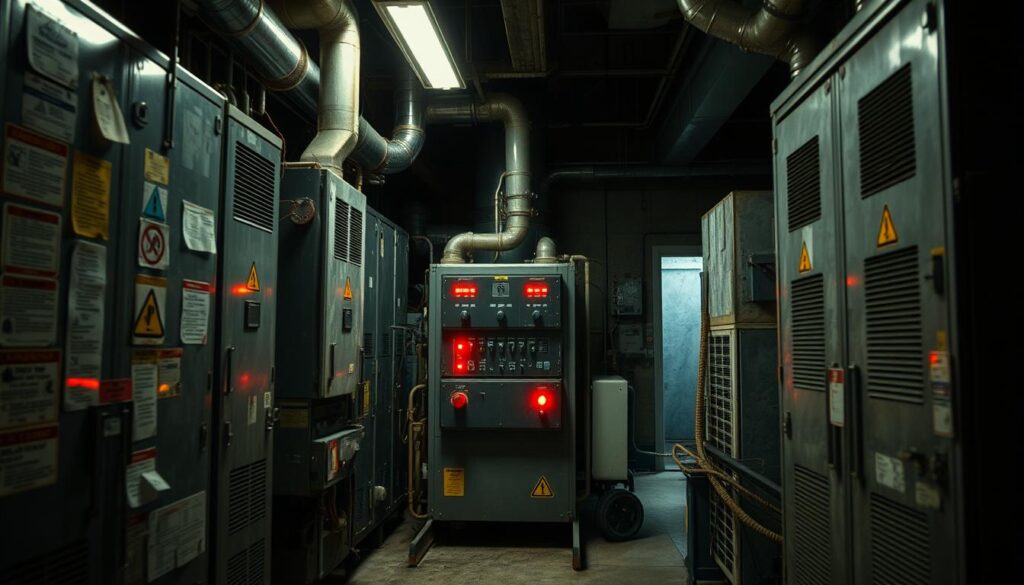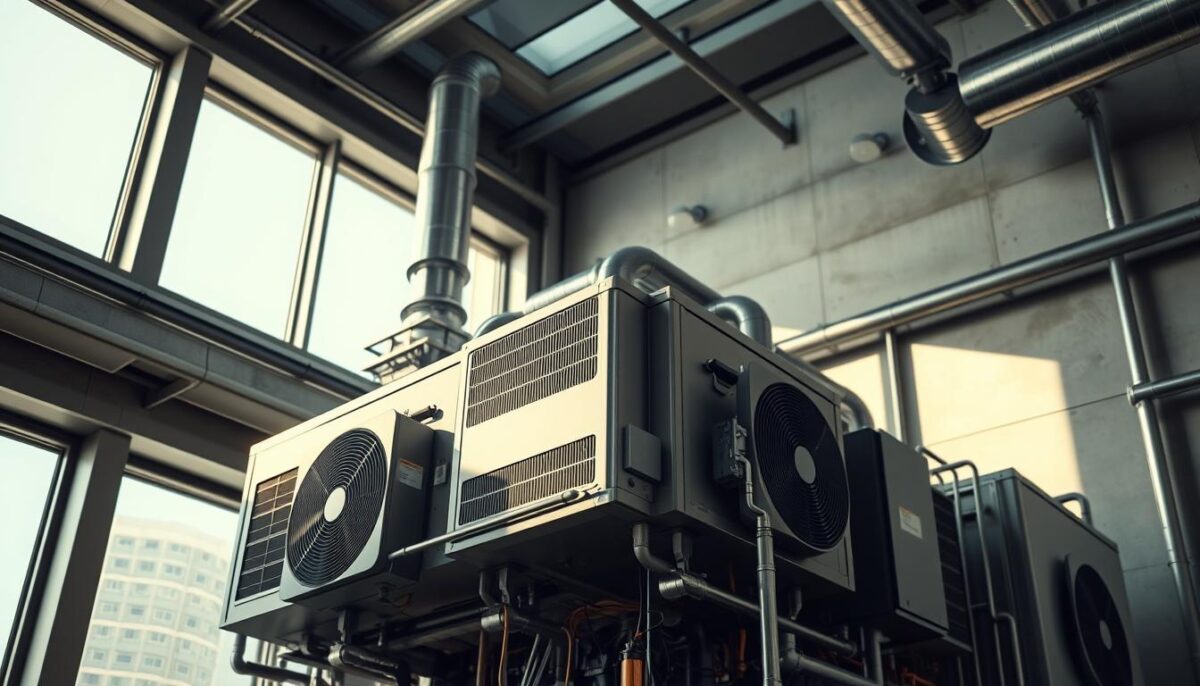How Long Should Your HVAC System Last? Lifespan Tips and Red Flags
Understanding the lifespan of your HVAC system is crucial for homeowners to plan for future expenses and ensure optimal home comfort. Most modern heating, ventilation, and air conditioning systems are designed to be efficient and durable.
The average lifespan of these systems ranges from 10 to 25 years, depending on the type of equipment and how well it’s maintained. Your heating and cooling equipment is one of the most significant investments in your home, responsible for maintaining comfortable temperatures and healthy indoor air quality year-round.
Regular maintenance and proper care can significantly extend the life of your heating and cooling equipment, saving you money and ensuring consistent performance throughout the seasons.
Key Takeaways
- Average lifespan of HVAC systems ranges from 10 to 25 years.
- Regular maintenance is crucial for extending system life.
- Type of equipment and maintenance quality affect longevity.
- Understanding system lifespan helps in planning future expenses.
- Proper care ensures consistent performance and saves money.
Understanding HVAC System Lifespan: What to Expect
Several key factors influence the lifespan of your HVAC system, affecting its overall performance and efficiency. As a homeowner, it’s essential to understand these factors to ensure your system operates optimally throughout its expected lifespan.
Average Lifespans of Different HVAC Components
Different components of your HVAC system have varying lifespans. Understanding these can help you anticipate when replacements might be needed.
Furnaces and Boilers
Furnaces and boilers are typically the longest-lasting components, with an average lifespan of 15 to 20+ years. Proper maintenance can significantly extend their operational life.
Air Conditioners
Air conditioners usually last between 10 to 15 years. Factors such as climate and maintenance quality play a significant role in determining their actual lifespan.
Heat Pumps
Heat pumps have an average lifespan similar to air conditioners, ranging from 10 to 15 years. Their efficiency and longevity can be influenced by usage patterns and environmental conditions.
Factors That Affect Your System’s Longevity
As noted by industry experts,
“A well-maintained HVAC system is crucial for both efficiency and longevity.”
The quality of installation is a critical factor, as a properly sized and installed system will operate more efficiently and last longer. Home insulation and professional air sealing are also vital, as they create a thermal boundary that prevents the system from being overworked.
Local climate conditions, including extreme temperatures and humidity levels, can significantly impact system longevity. For instance, high-humidity coastal areas can accelerate corrosion of components.
Installation Quality
The quality of your HVAC installation significantly impacts its lifespan. A properly installed system will operate more efficiently and last longer.
Home Insulation and Air Sealing
Proper home insulation and air sealing are crucial for preventing your HVAC system from being overworked, thus extending its lifespan.
Climate and Usage Patterns
Both your local climate and personal usage patterns directly affect how hard your HVAC system works. Extreme climates and frequent temperature adjustments can reduce system lifespan.
Maintenance History
Regular professional maintenance is perhaps the most significant factor affecting longevity. Annual service visits can identify and address issues before they cause major damage.
7 Warning Signs Your HVAC System Needs Replacement

Knowing when to replace your HVAC system can save you from unexpected breakdowns and costly repairs. Your heating, ventilation, and air conditioning (HVAC) system is crucial for maintaining a comfortable indoor environment, and its failure can lead to significant discomfort and expenses.
Increasing Energy Bills Despite Normal Usage
If you notice a steady increase in your energy bills without a corresponding change in your usage patterns, it could be a sign that your HVAC system is losing efficiency. An inefficient system works harder to achieve the desired temperature, thereby consuming more energy.
Frequent or Expensive Repairs
Frequent repairs are a clear indication that your HVAC system is nearing the end of its lifespan. If the cost of repairs is approaching or has exceeded 50% of the system’s value, it’s time to consider replacing it. The cost of maintaining an old air conditioning unit can be prohibitively expensive.
Strange Noises or Unusual Odors
Unusual noises or odors emanating from your HVAC system are red flags. Grinding, screeching, or banging noises could indicate mechanical issues, while musty smells might suggest mold growth within the system.
Inconsistent Temperatures Throughout Your Home
If you experience inconsistent temperatures in different parts of your home, it may indicate that your HVAC system is struggling to distribute air effectively. This inconsistency can be due to a failing system that needs to be replaced.
Poor Indoor Air Quality and Humidity Issues
A malfunctioning HVAC system can lead to poor indoor air quality and humidity issues. If you notice an increase in allergy symptoms or persistent humidity problems, it might be time to consider upgrading your system.
System Age Beyond Warranty Period
Most HVAC systems have a lifespan of 15 to 20 years. If your system is beyond its warranty period and experiencing issues, it’s likely nearing the end of its service life. Replacing it with a new, efficient air conditioner can save you money in the long run.
Use of Outdated R-22 Refrigerant
If your air conditioning system uses R-22 refrigerant, it’s a significant sign that it needs replacement. R-22 is being phased out due to environmental concerns, and using it can become increasingly expensive due to the scarcity of this refrigerant.
| Warning Sign | Description | Action Required |
|---|---|---|
| Increasing Energy Bills | Higher bills without increased usage | Check system efficiency |
| Frequent Repairs | Costly and recurring repair needs | Consider replacement |
| Strange Noises/Odors | Unusual sounds or smells from the system | Inspect for mechanical issues or mold |
Replacing your HVAC system at the right time is crucial. If you’re experiencing several of these warning signs, it may be more cost-effective to replace HVAC rather than continuing to repair it.
The $5,000 Rule: When to Repair vs. Replace Your HVAC
The $5,000 rule serves as a benchmark for homeowners to decide between repairing their current HVAC system and installing a new one. This rule is essentially a cost-benefit analysis that considers the cost of repairs versus the cost of a new system.
Calculating the Cost-Benefit Analysis
To apply the $5,000 rule, you need to calculate the total cost of hvac repairs and compare it to the cost of a new HVAC system. If the total repair cost exceeds 50% of the system’s replacement cost, or if you’ve spent more than $5,000 on repairs over the system’s lifetime, it might be more economical to replace the system. Modern HVAC systems offer dramatic efficiency improvements, potentially reducing your energy consumption by 20-40%. This significant reduction can lead to substantial savings on your utility bills.
- A new, high-efficiency HVAC system can represent significant savings over the longer haul.
- While the upfront cost is substantial, the monthly energy savings often provide a return on investment within 5-10 years.
- Many utility companies offer rebates and incentives for upgrading to high-efficiency HVAC systems.
Considering Energy Efficiency Improvements
Upgrading to a new HVAC system, especially one with high efficiency, can lead to considerable energy savings. Heat pumps, for instance, are highly efficient and can reduce heating energy use by up to 50% compared to conventional furnaces and boilers. They offer the added benefit of providing both heating and cooling from a single system.
Some key benefits of modern HVAC systems include:
- Reducing energy consumption by 20-40% compared to older models.
- Heat pumps can reduce heating energy use by up to 50%.
- Modern variable-speed and multi-stage systems adjust their output to match your home’s needs precisely.
By considering these factors and applying the $5,000 rule, homeowners can make an informed decision about whether to repair or replace their HVAC system, potentially saving money and improving their home’s comfort and efficiency.
Essential Maintenance Tips to Maximize Your HVAC System Lifespan
To maximize the lifespan of your HVAC system, regular maintenance is crucial. A well-maintained system not only lasts longer but also operates more efficiently, saving you money on energy bills. Here are some essential tips to keep your HVAC system in top condition.
Regular Filter Changes and Cleaning
One of the simplest yet most effective ways to maintain your HVAC system is by regularly changing and cleaning its filters. Dirty filters can cause the system to work harder, leading to increased energy consumption and wear on the system. It’s recommended to check filters monthly and replace them every 1-3 months, depending on usage and manufacturer guidelines. As Constellation suggests, maintaining clean filters is a straightforward way to ensure your system runs efficiently.
Professional Annual Service Visits
Scheduling annual service visits with a professional HVAC technician can help identify potential issues before they become major problems. These visits typically include a thorough inspection, cleaning of critical components, and any necessary adjustments or repairs. This proactive approach can significantly extend the life of your HVAC system. For more detailed information on extending the lifespan of your HVAC system, you can visit Constellation’s guide on HVAC lifespan and.
Proper Thermostat Settings and Usage
Your thermostat plays a significant role in the efficiency and longevity of your HVAC system. Setting your thermostat to a reasonable temperature and avoiding extreme changes can reduce the workload on your system. Consider investing in a programmable thermostat to automate temperature adjustments when you’re not home or when you’re sleeping.
Keeping Outdoor Units Clear of Debris
Outdoor units, such as air conditioners and heat pumps, need adequate airflow to function efficiently. Keeping the area around these units clear of debris is essential. Maintain at least 2 feet of clearance around all sides and 5 feet above. Regularly remove leaves, grass clippings, and dirt, and trim back any plants or shrubs that could interfere with the unit’s operation. Gently cleaning the exterior condenser coils with a garden hose at the start of each cooling season can also help maintain efficiency.
By following these maintenance tips, you can significantly extend the lifespan of your HVAC system, ensuring it operates efficiently and effectively for years to come. As an industry expert once said, “Regular maintenance is not just about preventing breakdowns; it’s about optimizing performance and longevity.” This proactive approach not only saves you money but also enhances the comfort and air quality in your home.
Making the Smart Choice for Your Next HVAC System
As you consider replacing your HVAC system, understanding the latest technologies and options available can help you make the best decision. An electric air sourceheat pumpis highly recommended for its energy efficiency, as it can heat and cool your home using as little as 1/3 the energy of traditionalHVACsystems.
When selecting a newHVACsystem, it’s essential to consider not just the upfront cost but also long-term energy efficiency, maintenance requirements, and expected lifespan.Heat pumpshave emerged as a leading choice for energy-efficient home comfort, providing bothheatingandcoolingfrom a single system.
Modern air-sourceheat pumpscan operate efficiently even in cold climates, making them a viable option for many homeowners. For homes currently using oil or propaneheating, switching to an electricheat pumpcan provide substantial cost savings while reducing environmental impact.
To make an informed decision, consider the size and layout of your home, and look into options like zoned systems or ductless mini-splitheat pumps. When evaluating AC contractors for installation, ensure they have proper licensing, manufacturer certifications, and experience with the specifictypeof system you’re considering.
For more information on the lifespan of differentHVACsystems, you can visitCNET’s guide on HVAC system lifespan. Proper sizing and installation are critical for achieving the efficiency and lifespan the manufacturer intended. By choosing the right system and installer, you can enjoy a more comfortable, energy-efficient home.




